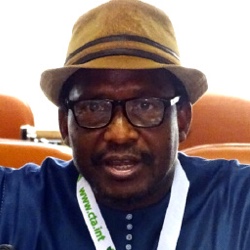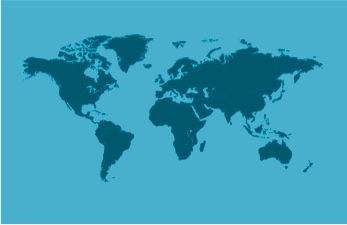

Letter from the Chairs
The world is facing many stresses and shocks: continuing COVID-19 impacts, climate change, political and economic instability, and an emerging food crisis driven by Russia’s invasion of Ukraine. Millions of people, including smallholder farmers, are being pushed deeper into hunger and food insecurity every day. In the Horn of Africa alone, 49 million people will face acute food insecurity by September and women bear a disproportionate share of the burden. In the face of growing suffering, the global community must come together to ramp up and coordinate efforts to build more sustainable and resilient food systems, particularly in the world’s poorest countries.
BOOSTING LONG-TERM RESILIENCE
For the Global Agriculture and Food Security Program (GAFSP), these past few years have shown the critical role the Program plays in supporting the most vulnerable countries and communities. In this year’s report, you’ll read about how smallholder farmers and their families are strengthening their resilience despite setbacks caused by the global pandemic and other crises. In 2021, we saw good progress in our portfolio, reaching over 16 million people, including nearly 7 million women, and helping farmers adapt and respond to extraordinary challenges. Building on GAFSP’s quick response to rising food insecurity linked to COVID-19, GAFSP provided over US$150 million in grants for countries and, for the first time, producer organizations.
2021 was also a year of big milestones, including celebrating a decade of the Private Sector Window’s impact through investments in a range of agribusinesses — from cocoa in Côte d’Ivoire to dairy farms in Uganda. GAFSP will continue to advance both our public and private sector work to progress towards the Sustainable Development Goals (SDGs) – particularly SDG2, which seeks to end hunger – by 2030.
BUILDING ON OUR ACHIEVEMENTS
This coming year, GAFSP will work quickly and proactively to respond effectively to the emerging food security crisis and support locally-led investments. In addition, GAFSP will deepen the integration of climate considerations and solutions into its operations. Smallholders often bear the brunt of climate change and, at the same time, are best placed to identify and implement the solutions that work for them.
As the world rushes to provide immediate, emergency food assistance, we must remember that building long-term resilience is just as critical to ensuring our food systems are sustainable. We have a unique opportunity to transform these systems to become more resilient, but we need to close the financing gap for agriculture. During the 2021 Call for Proposals, GAFSP received over US$1 billion in funding requests – ten times what GAFSP could fund – signaling the high demand for grant financing. GAFSP will continue to have an important role in supporting the development of more sustainable and resilient food systems through innovative solutions.
As the new GAFSP Steering Committee Chairs, Canada and the United States share GAFSP’s vision to build a world where local farmers and businesses can feed healthy families for generations to come.

Corry van Gaal
Chair of the GAFSP Steering Committee

Nicholas Strychacz
Chair of the Private Sector
Window Donor Committee



Letter from Civil Society
2021 was a challenging year for the fight against hunger, with the number of people facing food insecurity and malnutrition continuing to increase. A recent World Food Programme assessment report says that around 193 million people in 53 countries or territories experienced acute food insecurity at crisis or worse levels in 2021, representing a dramatic increase of 25 percent – 38 million people – compared to the already record numbers of 2020.
The interconnection of climate change, conflict, the COVID-19 pandemic, and, more recently, the Ukraine war is leading us off track to achieving SDG2 by 2030. We are now in an even worse situation than ten years ago, with more people going hungry and a rapid acceleration of environmental degradation. The most vulnerable, especially women and children, bear the worst effects of these crises, while small-scale food producers and those living in rural areas represent the hungriest in the world. However, they are the solution, not the problem.
GAFSP was established in 2010 in response to the 2007-08 food crisis to support countries in need to cope with the effects of food price spikes and to continue investing in the agricultural sector, which is not only an engine for economic growth but also the backbone of resilience and food security for millions of rural people. Sustainable food systems play a significant role in restoring people’s livelihoods and the planet, but moving in this direction requires investment in small-scale food producers and their solutions.
The Ukraine war is aggravating global food insecurity, leading to a looming global food crisis where humanitarian interventions and immediate food aid need risk to prevail on long-term development solutions. Providing social protection and safety nets immediately to support the most vulnerable is paramount, but investing in resilient food systems through small-scale farmers using GAFSP is also crucial to prevent future crises and build a more resilient and sustainable world.
In 2021, GAFSP provided a rapid response to the outbreak of the COVID-19. It also launched its Sixth Call for Proposals to support medium to long-term responses to the pandemic. For the first time, 12 projects led by producer organizations were awarded direct grants, paving the way for an innovative approach for development support anchored in producer organizations’ own ideas and steering. The assessment of the first five piloted projects (known as the Missing Middle Initiative) under this approach demonstrated how community-led experiences and sustainable small-scale farming proved more resilient to climate change and market disruptions during the pandemic. This is where we need to canalize investment and support.
As GAFSP Steering Committee representatives of civil society and small-scale food producers from Africa and Asia, we will continue to bring the perspectives of the most affected by hunger and food insecurity to ensure that GAFSP programs and interventions are closely aligned with farmers’ priorities across the world. We will also continue to ensure that GAFSP responds to the high challenges we have ahead while also adopting approaches that work best for farmers.

Alberta Guerra
Senior Policy Analyst, ActionAid USA

Ibrahima Coulibaly
President, West African Network of Peasants and Agricultural Producers (ROPPA)

U Than Swe
Chairperson, Asian Farmers’ Association for Sustainable Rural Development (AFA)


